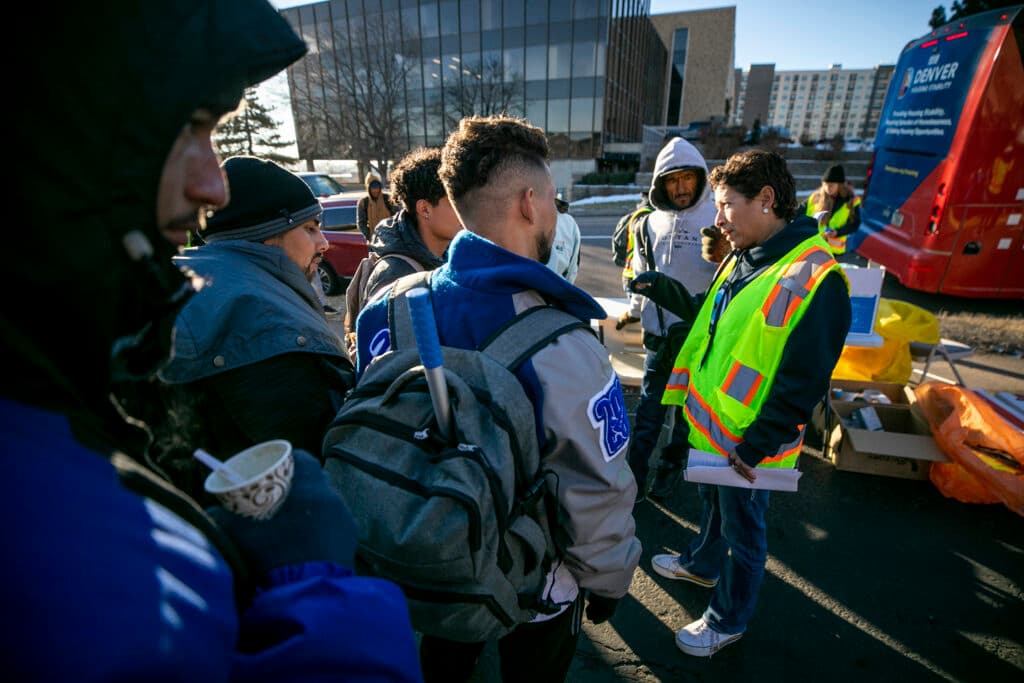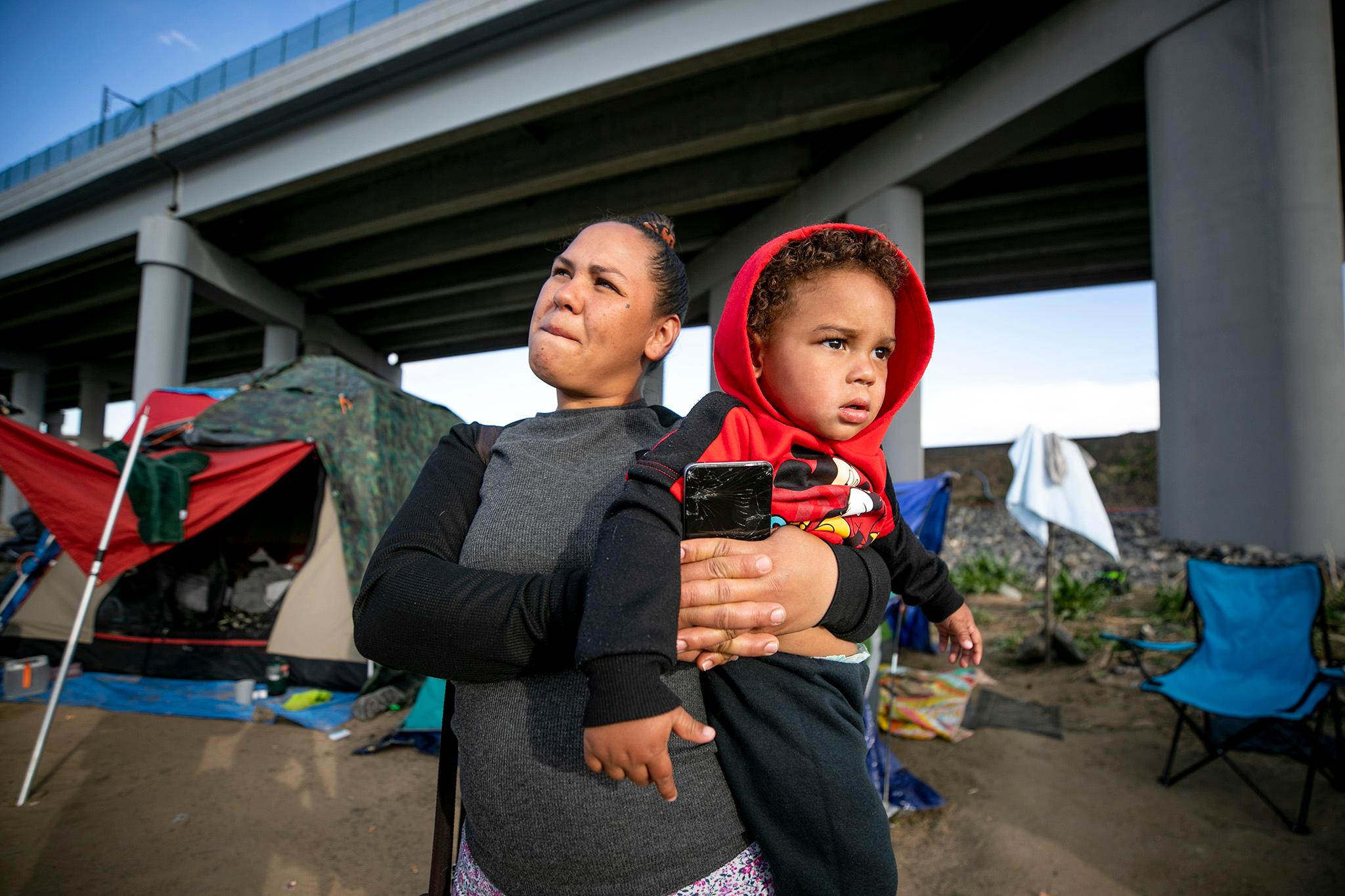Federal border officials allowed Rosbely Sira Linarez, her husband and newborn son to cross into the U.S. in early May, 2023, after a long journey from Venezuela. It only took them a week to get to Denver once they were released, arriving alongside so many others to a city that was still learning what their presence meant. Mayor Michael Hancock was still in office, and Denver's shelter system had yet to be seriously tested.
Linarez's family stayed in the Quality Inn, a hotel-turned-shelter off Speer Boulevard, for a month. Then, Servicios de la Raza, a longstanding community service nonprofit that's received money specifically to serve newcomers, helped them get into an apartment.
"They gave me a month's help, plus the deposit," Linarez told us. "I was there until they kicked me out."
The couple and their one-year-old are now living in a tent beneath a bridge, in an encampment that's about to be swept by authorities. Linarez said they were evicted because they couldn't keep up with their bills. Some of their neighbors under the bridge, other new arrivals, said they were in similar positions.
Thousands of people have received financial help to move out of shelters, off the streets and into more permanent housing. People in Linarez's shoes may represent a small minority of all those cases, but nobody can really say for sure.
It's an issue that's been raised in recent City Council meetings as Mayor Mike Johnston's administration shrinks overall offerings for newcomers, focusing instead on longterm success for about 800 people.
Advocates say they've seen other similar evictions, but how widespread this problem is depends who you ask.
Though both she and her husband qualify for Temporary Protected Status to live and work in the U.S., neither had attained work authorization when they moved in. Linarez said her husband did manage to land some gigs, mostly construction, but not everyone who hired him actually paid, then the offers dried up once winter arrived. They made it 10 months before their landlord threatened eviction.
"We fell behind," she said. "My husband lost his job and so we didn't pay [the rent], but rather we used the money for the things we needed."
Denverite met another family with young children, at the camp under the bridge, who also said they'd been evicted. Another family said they were in line for rental assistance, but hit a wall when it was clear they didn't have work authorization and couldn't maintain their lease.

Candice Marley is an advocate who's helped homeless immigrants set up tent villages, like this one, around the city since officials began shuttering hotel shelters earlier this year. resetting each time they're discovered by authorities and forced to move along. She said Linarez's story is typical.
"The majority of our camp, to begin with, was all coming from evictions," she told us. "Some in the group were working, but it was never enough to pay for the apartments they were in."
People typically need to show proof of employment to attain a lease, but she said some just asked one-off clients – like people who paid to have their houses cleaned – for letters. In some cases, Marley said, those letters were enough to get people into homes while obscuring instability that would eventually ruin the situation. She founded a new organization, All Souls Denver, to address the continuing need.
James Gillespie, vice president of development for Servicios de La Raza, agreed that keeping people housed is hard.
"The challenge is this: We are limited per the funder to only provide for that first month of financial support," he wrote us. "Though we work with many clients to help them seek pathways toward getting work authorization, not every client is eligible to do so. And even for those that are, that takes significant lead time—and many times, more lead time than that one month that is being covered by emergency housing funds."
He added that keeping track of evictions can also be tricky. Leases are between tenants and landlords. If someone is evicted, he said, they don't have to notify the nonprofit.

Yoli Casas is director of ViVe Wellness, another nonprofit that's been housing people with state funds, and also said eviction counts are slippery. Still, she said she thinks most of the 8,500 people she said have been helped into more than 2,000 leases have not lost their new homes.
"I would say a small percent," she told us. "I don't know how big it is, but it's not huge, because people are still living in housing."
Jon Ewing, Denver Human Services' spokesperson, said he also doesn't think it's a "widespread issue."
Prospects for further help are grim, as the city has telegraphed.
Officials say border arrivals have dropped significantly in recent months. In the lull, Mayor Johnston has framed his new asylum program as a transition from an emergency response to something more sustainable.
But things have not slowed down for Marley, who's been pushing the city to allow a sanctioned campsite because she worries so many are close to homelessness. Denver's planning department confirmed they've spoken to her about how to file an application for her own campsite in a Cole parking lot. She said the mayor's office talked to her about the idea for a few months before ultimately expressing their disinterest.
"These people are already camping outside. What is the issue with providing a safe campground?" she said. "They could make that happen if they really want it to, but they don't. It's just so frustrating."
Ewing said they probably won't get behind the idea.
"There's a camping ban in the city," he said. "It's not really the outcome we really want for anyone to begin with."
While Ewing said some emergency shelter is available to people living under the bridge, officials have made clear no one outside of Mayor Johnston's new asylum program will receive extra rental help in the future. It's not likely those short-term options will provide the "lead time" that Gillespie said people need to find true stability.
Other advocates have tried to deal with the impasse between rent and work status in other ways. Leaders of the very active "Highlands Moms" mutual aid group started a nonprofit that's working with the Mile High United Way to help locals host newcomer families in their own homes. Andrea Ryall, who's been building that program, said it's specifically meant to address new immigrants' precarious economic situations.

Johnston's administration is also assembling an eviction "working group" to keep an eye on the issue. Though they're limiting what they'll spend on new arrivals, this body is meant to make sure existing resources, available to anyone, are also available.
Linarez said her former landlord took her to court when she couldn't pay her rent. They said they wouldn't formally evict her if she moved out by April 5th, helping her dodge a black mark on her permanent record.
But, before she packed up, moved some things and gave other away, she made one last attempt to save the roof over her head. She told us she applied for one of those city-backed resources, Temporary Rental & Utility Assistance. It didn't pan out.
"I do have the application and everything. They never called me," she said. "The eviction day arrived, and I had to leave."













